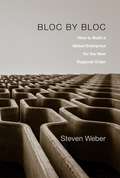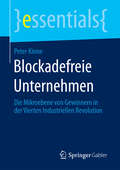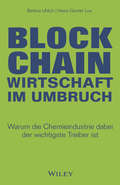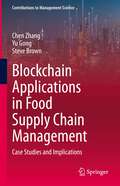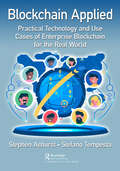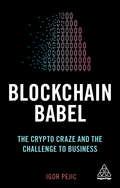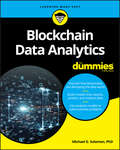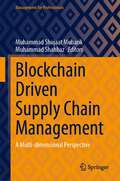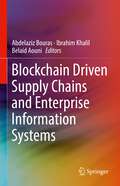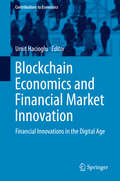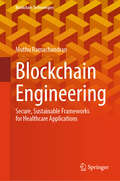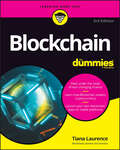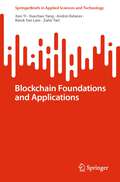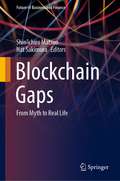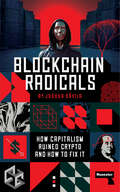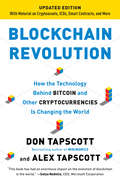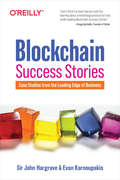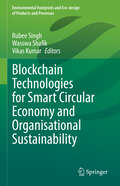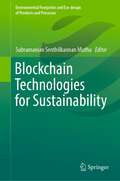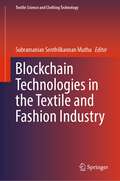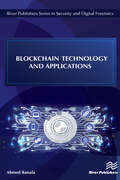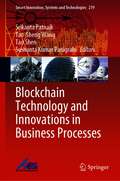- Table View
- List View
Bloc by Bloc: How to Build a Global Enterprise for the New Regional Order
by Steven WeberGlobalization is taking a step backward. What, then, is the best way to organize a global enterprise? The key, Steven Weber explains, is to prepare for a world increasingly made up of competing regions with distinct rules and standards. This new condition could be more prosperous, but there will also be more friction and therefore more risk.
Blockadefreie Unternehmen: Die Mikroebene von Gewinnern in der Vierten Industriellen Revolution (essentials)
by Peter KinneAnhand ganz unterschiedlicher Beispiele setzt Peter Kinne die Zukunftsf#65533;higkeit von Unternehmen in Beziehung zu Merkmalen ihrer Akteure. Dabei zeigt er interessante Parallelen im Erleben produktiver Abl#65533;ufe, bei Orientierungsgr#65533;#65533;en, in der Dialogkultur, der Haltung zu soziokultureller Vielfalt, in F#65533;hrungspraktiken und bei intrinsischen Innovationstreibern auf. Betriebliche Blockaden k#65533;nnen offenbar durch bestimmte Merkmale verhindert werden. Ein m#65533;chtiger Ausl#65533;ser solcher Blockaden ist Komplexit#65533;t. Sie pr#65533;gt das Spielfeld, auf dem der Wettbewerb in der sogenannten Vierten Industriellen Revolution ausgetragen wird. Diese Betrachtung aus Sicht des strategischen Managements liefert neue Impulse f#65533;r die Auswahl und Entwicklung von Fach- und F#65533;hrungskr#65533;ften und f#65533;r sinnvolle Standards.
Blockbuster Inc. & Technological Substitution (A): Achieving Dominance in the Video Rental Industry
by Peter J. Coughlan Jennifer L. IllesProvides a comprehensive background of the video rental industry and home entertainment giant, Blockbuster Inc. Follows the life of Blockbuster Inc. from its first days under founder Wayne Huizenga to its most recent developments under 2003 CEO John Antioco. By looking at various strategic decisions its leaders have made throughout the past few decades, students come to understand better how Blockbuster Inc. has become the industry's dominant player. Also explores the fascinating economics of the home video industry, paying particular attention to the unique revenue-sharing model that has developed in recent years. Understanding Blockbuster Inc. and the video industry's background also allows students to analyze better the various technological substitution threats (such as DVD, DIVX, sell-through, home delivery services, Internet subscription services, personal video recorders, pay-per-view, and video-on-demand).
Blockbuster Inc. & Technological Substitution (C): The Internet Changes the Game
by Peter J. Coughlan Jennifer L. IllesInvestigates how the rise of the Internet as a vehicle for renting and buying movies has disrupted the video rental industry and how market leader Blockbuster Inc. can and should respond to these developments. Explores how the emergence of e-commerce affects the degree to which consumers buy instead of rent low-priced DVDs and how Blockbuster might adjust its online initiatives in response. Details the rise of Internet-enabled substitution threats, such as home delivery services (e.g., Kozmo.com) and Internet subscription services (e.g., Netflix.com), and investigates the potential options and chosen actions of Blockbuster Inc. as it seeks to maintain its competitive position. In times of technological change, firms continuously face decisions regarding the extent to which they should embrace a technologically advanced substitute at the possible expense of their existing products and services. Guides the reader through Blockbuster's decisions and its resulting responses.
Blockbuster Inc. & Technological Substitution (D): The Threat of Direct Digital Distribution
by Peter J. Coughlan Jennifer L. IllesExamines the emergence of technologies for delivering video content to consumer homes via direct digital distribution and investigates the strategic options facing video rental giant Blockbuster Inc. as it tries to respond to the new technological substitutes. Examines the impact of personal video recorders (or digital video recorders) on the market for Blockbuster's main complementary products, the VCR and DVD player, and explores how this technology might ultimately impact Blockbuster. Addresses the current and future impact of video-on-demand, the latest incarnation of the long enduring pay-per-view technology, and analyzes Blockbuster's potential and actual response to the threat. In times of technological change, firms continuously face decisions regarding the extent to which they should embrace a technologically advanced substitute at the possible expense of their existing products and services.
Blockchain - Wirtschaft im Umbruch: Warum die Chemieindustrie dabei der wichtigste Treiber ist
by Bettina Uhlich Heinz-Gunter LuxDie Geschäftswelt steht vor einer radikalen Veränderung, deren Dimension als historisch bezeichnet werden muss. Wer früher Geschäfte machen wollte, musste seinen Geschäftspartnern vertrauen. Mit Blockchain braucht niemand mehr dem anderen zu vertrauen, wenn er kaufen oder verkaufen will. Vertrauen wird durch Wissen ersetzt, denn die Blockchain zeigt uns alle Fakten, die die Ware, den Zahlungsverkehr oder den Transport betreffen, fälschungssicher in vollautomatisierten "Smart Contracts" an. Damit ändert sich das Geschäftemachen radikal. Revolutionär ist aber noch anderes: Blockchain zwingt Banken, Steuerberater und Investoren ihre Geschäftsmodelle radikal zu überdenken. Da Geld und Waren in der Blockchain durch den digitalen Zwilling direkt miteinander gekoppelt sind, braucht es die Zwischenhändler nicht mehr. Monopole werden entmachtet, Geschäfte dezentral organisiert. Neue Geschäftsmodelle müssen her und die sind ebenso spannend wie die Blockchain selbst. Doch damit nicht genug. Bisher asynchrone Geschäftsabläufe werden durch die Blockchain synchronisiert. Was heute noch im Nacheinander in so genannten Silos mit den Geschäftspartnern mühsam organisiert werden muss und große Datenverluste erzeugt, wird morgen für jeden in Echtzeit - ohne jeglichen Datenverlust - einsehbar sein. Die Überproduktion von Waren gehört dem Gestern an, Recyclingkreisläufe werden minutiös nachvollziehbar, Korruption nachweisbar und Entwicklungsländer können problemlos am internationalen Handel teilnehmen. Blockchain bedeutet also so viel mehr als Kryptowährungen oder Bitcoins. Genau hier setzt das Buch an. Es erklärt den disruptiven wirtschaftlichen Wandel, der mit der Blockchain-Technologie einhergeht, kompetent und in verständlicher Sprache. Das Buch will aufklären, informieren und wachrütteln. Die Chemieindustrie wird dabei der entscheidende Treiber bei der flächendeckenden Einführung der Blockchain-Technologie in die Wirtschaft sein, weil sie mit der gesamten produzierenden Industrie vernetzt ist - und zwar weltweit. Wenn sie Blockchain einführt, müssen alle mitziehen, und das schon bald, denn die Chemie steht kurz davor, genau das zu tun. Namhafte Vertreter aus der Blockchain-Szene, Start-ups, Finanz-Branche und der Chemieindustrie sowie Vertreter der Bundesregierung und der EU-Kommission kommen in Interviews zu Wort. Die Autoren selbst haben verantwortliche Positionen in einem weltweit agierenden Chemiekonzern. Es geschieht selten, dass sich solche Insider, aber auch Fachexperten und Entscheider aus der Industrie zum anstehenden Umbruch der Wirtschaft durch Blockchain äußern. Jetzt ist es der Fall. Auch das ein Novum.
Blockchain Applications in Food Supply Chain Management: Case Studies and Implications (Contributions to Management Science)
by Steve Brown Chen Zhang Yu GongThis book contributes to blockchain applications in food supply chain management from both theoretical and practical perspectives. By using the case study research method, it empirically investigates why and how food companies implement blockchain technology. Moreover, it proposes a conceptual framework based on the case findings and extant literature. The book provides empirical evidence to verify academic findings such as critical success factors and barriers. Furthermore, it identifies the implementation process to answer the ‘how’ question. Uniquely, it applies the innovation process model and the practice-based view (PBV) to studies on food supply chains and blockchain. Thus, building on the original model and theory, it enriches the theory on blockchain implementation, making it a valuable asset for all researchers and practitioners interested in blockchain adoption and food supply chain management.
Blockchain Applied: Practical Technology and Use Cases of Enterprise Blockchain for the Real World
by Stephen Ashurst Stefano TempestaBlockchain is an emerging technology for organizations to almost instantaneously make and verify transactions, streamlining business processes, saving money, and reducing the potential for fraud. This book covers the application of blockchain technology to the enterprise world, it describes the opportunities and challenges for adoption of DLT (Digital Ledger Technology) in a corporate environment, and specific use cases that may benefit from a decentralized and distributed trustless network. There are many books on blockchain, the new de-centralised ledger technology made famous (or infamous) by Bitcoin, Onecoin and others. But as cryptocurrencies and stock markets rise and fall with surprise volatility and the world economy emerges changed by coronavirus and the resulting economic crash, many in industry are looking again at the powerful features of blockchain and how these may help them adapt. This new book sets out the core features of blockchain and uniquely describes, in natural language and in real-life scenarios, how de-centralised ledgers may affect industries as varied as virus-tracking apps, finance, investment and healthcare.
Blockchain Babel: The Crypto Craze and the Challenge to Business
by Igor PejicBlockchain is the technology behind bitcoin and other crypto-currencies. According to Santander, it could save financial institutions $15-20bn a year from 2022 onward. Most experts see an unprecedented potential, but many banks, payment processors and credit card companies fret that bitcoin entrepreneurs could cast a pall over their core business. Whatever the position of blockchain, many voices are shouting from different angles, creating a cacophony of confusion including tech-evangelists, anarcho-libertarians, and industry experts. But while everybody in IT and banking seems to have an opinion on the blockchain, there is little systematic research, no strategic analysis. Blockchain Babel is the ultimate guide to the most disruptive technology to have entered the finance industry in recent years.Blockchain Babel looks at blockchain alongside innovation diffusion, competitive dynamics and management strategy. Shortlisted as one of the three best business book proposals by McKinsey and the Financial Times for the Bracken Bower Prize in 2016, this is a must-read for business leaders and aspiring leaders wanting to grasp blockchain and put it into context and understand the practical implications it may have.
Blockchain Data Analytics For Dummies
by Michael G. SolomonGet ahead of the curve—learn about big data on the blockchain Blockchain came to prominence as the disruptive technology that made cryptocurrencies work. Now, data pros are using blockchain technology for faster real-time analysis, better data security, and more accurate predictions. Blockchain Data Analytics For Dummies is your quick-start guide to harnessing the potential of blockchain. Inside this book, technologists, executives, and data managers will find information and inspiration to adopt blockchain as a big data tool. Blockchain expert Michael G. Solomon shares his insight on what the blockchain is and how this new tech is poised to disrupt data. Set your organization on the cutting edge of analytics, before your competitors get there! Learn how blockchain technologies work and how they can integrate with big data Discover the power and potential of blockchain analytics Establish data models and quickly mine for insights and results Create data visualizations from blockchain analysis Discover how blockchains are disrupting the data world with this exciting title in the trusted For Dummies line!
Blockchain Driven Supply Chain Management: A Multi-dimensional Perspective (Management for Professionals)
by Muhammad Shahbaz Muhammad Shujaat MubarikThe book aims to present a multi-dimensional view on the blockchain-driven supply chain management and its linkage with open innovation, digital technologies, supply chain sustainability, mapping, visibility, and resilience. It offers topic from three important themes: first, what is the architecture and design of BCSCM and how does it differ from the conventional supply chains; second, performance impacts of BCSCM; and third, implementation challenges and role of leadership. Hence, the book provides a diverse perspective on the understanding, architecture, impacts, and implementation of blockchain-driven supply chain management. It shows the importance of blockchain-driven supply chain management for contemporary organizations: how it contributes to supply chain traceability, resilience, and sustainability.The book also demonstrates as to how adoption of blockchain-driven supply chain management requires to consider intangible forms of intellectual capital (human, processes, and relationships), which is different from more traditional forms. This is a book for supply chain management practitioners, researchers, and academician who want to understand the role of blockchain in supply chain, for supply chain managers who want to be at the cutting edge by adopting the BCSCM, for those early in their careers who seek a challenging new path, and for the top-level managers of the world who have their eye on the future.
Blockchain Driven Supply Chains and Enterprise Information Systems
by Abdelaziz Bouras Ibrahim Khalil Belaid AouniBlockchain Driven Supply Chains and Enterprise Information Systems examines initiatives for blockchain implementation in supply chain management and the integration of blockchain technology with existing enterprise management applications. The authors aim to establish common ground to provide solutions and best practices in the supply chain field, while tackling the challenges faced when integrating blockchain in supply chain policy. Chapters address both design and implementation aspects of supply chain platforms and enterprise information systems, and provide real-world use cases and examples from industry that address the impacts of using blockchain in the modern supply chain.
Blockchain Economics and Financial Market Innovation: Financial Innovations in the Digital Age (Contributions to Economics)
by Umit HaciogluThis book discusses various aspects of blockchains in economic systems and investment strategies in crypto markets. It first addresses the topic from a conceptual and theoretical point of view, and then analyzes it from an assessment and investment angle. Further, it examines the opportunities and limitations of the taxation of crypto currency, as well as the political implications, such as regulation of speculation with crypto currencies. The book is intended for academicians and students in the fields of economics and finance.
Blockchain Engineering: Secure, Sustainable Frameworks for Healthcare Applications (Blockchain Technologies)
by Muthu RamachandranThis book provides a comprehensive guide to the principles and engineering approaches necessary for developing secure and sustainable blockchain applications. It introduces fundamental blockchain concepts and explores the integration of AI and blockchain. Targeted at students, IT professionals, managers, and healthcare practitioners, this book seeks to empower readers to effectively leverage blockchain technology.
Blockchain For Dummies
by Tiana LaurenceCarve out your niche in the exploding world of blockchain technology Cryptocurrency, NFTs, smart contracts, and ever-more-important business and finance functions—they all run on blockchain. Blockchain For Dummies is the must-have guide to the basics of blockchain. This clear reference breaks down exactly what blockchain technology is, how it’s used across industries, and what it all means for you and your investment portfolio. Learn the latest token standards, emerging tools and platforms, and opportunities that you’ll want to hop aboard. This book demystifies all of it, so you can understand and profit from this major disruptor in the world of finance. Evaluate new ideas and trends, make smarter decisions, and establish your presence on your blockchains of choice. Peek under the hood of the new tech that’s changing finance (and everything else) Learn how blockchain powers cryptocurrency and smart contracts Launch your own blockchain apps on stable platforms Understand and take advantage of blockchain investment opportunitiesInvestors, financial pros, and technologists who need Blockchain 101 will love Blockchain For Dummies. Exploring blockchain to build your personal portfolio? This book has your essentials.
Blockchain Foundations and Applications (SpringerBriefs in Applied Sciences and Technology)
by Xun Yi Zahir Tari Kwok Yan Lam Xuechao Yang Andrei KelarevThis monograph provides a comprehensive and rigorous exposition of the basic concepts and most important modern research results concerning blockchain and its applications. The book includes the required cryptographic fundamentals underpinning the blockchain technology, since understanding of the concepts of cryptography involved in the design of blockchain is necessary for mastering the security guarantees furnished by blockchain. It also contains an introduction to cryptographic primitives, and separate chapters on bitcoin, ethereum and smart contracts, public blockchain, private blockchain, cryptocurrencies, and blockchain applications.This volume is of great interest to active researchers who are keen to develop novel applications of blockchain in the field of their investigatio. Further, it is also beneficial for industry practitioners as well as undergraduate students in computing and information technology.
Blockchain Gaps: From Myth to Real Life (Future of Business and Finance)
by Shin’ichiro Matsuo Nat SakimuraThis book analyzes the fundamental issues faced when blockchain technology is applied to real-life applications. These concerns, not only in the realm of computer science, are caused by the nature of technological design. Blockchain is considered the foundation of a wide range of flexible ecosystems; its technology is an excellent mixture of mathematics, cryptography, incentive mechanisms, economics, and pertinent regulations. The book provides an essential understanding of why such fundamental issues arise, by revising the underlying theories. Blockchain theory is thus presented in an easy-to-understand, useful manner. Also explained is the reason why blockchain is hard to adopt for real-life problems but is valuable as a foundation for flexible ecosystems. Included are directions for solving those problems and finding suitable areas for blockchain applications in the future. The authors of this work are experts from a wide range of backgrounds such as cryptography, distributed computing, computer science, trust, identity, regulation, and standardization. Their contributions collected here will appeal to all who are interested in blockchain and the elements surrounding it.
Blockchain Radicals: How Capitalism Ruined Crypto and How to Fix It
by Joshua DávilaBlockchain Radicals uncovers the radical political potential of the blockchain, showing how it can be used by the left in the fight against capitalism.The blockchain is often understood only in its simplistic relationship to financial speculation and marketed as a way to onboard potential customers into the crypto economy. But what if it held a more radical potential that was waiting to be unlocked?By moving past simply equating the blockchain with cryptocurrency and instead trying to understand what these tools do and how they work, Blockchain Radicals shows how the blockchain can be used by a left that is in need of new ideas in its struggle to create a better world for all. Steering between boosters on the right and cynics on the left, it shows us how the blockchain is a space where new post-capitalist strategies and collectives are already emerging.Questioning all the assumptions we have about currencies, markets, information, politics, and its limitations, the blockchain allows us to begin moving past the question of why the future has seemed to be standing still for so long.
Blockchain Revolution: How the Technology Behind Bitcoin Is Changing Money, Business, and the World
by Don Tapscott Alex TapscottThe technology likely to have the greatest impact on the future of the world economy has arrived, and it’s not self-driving cars, solar energy, or artificial intelligence. It’s called the blockchain. The first generation of the digital revolution brought us the Internet of information. The second generation—powered by blockchain technology—is bringing us the Internet of value: a new, distributed platform that can help us reshape the world of business and transform the old order of human affairs for the better. Blockchain is the ingeniously simple, revolutionary protocol that allows transactions to be simultaneously anonymous and secure by maintaining a tamperproof public ledger of value. Though it’s the technology that drives bitcoin and other digital currencies, the underlying framework has the potential to go far beyond these and record virtually everything of value to humankind, from birth and death certificates to insurance claims and even votes. Why should you care? Maybe you’re a music lover who wants artists to make a living off their art. Or a consumer who wants to know where that hamburger meat really came from. Perhaps you’re an immigrant who’s sick of paying big fees to send money home to loved ones. Or an entrepreneur looking for a new platform to build a business. And those examples are barely the tip of the iceberg. This technology is public, encrypted, and readily available for anyone to use. It’s already seeing widespread adoption in a number of areas. For example, forty-two (and counting) of the world’s biggest financial institutions, including Goldman Sachs, JPMorgan Chase, and Credit Suisse, have formed a consortium to investigate the blockchain for speedier and more secure transactions. As with major paradigm shifts that preceded it, the blockchain will create winners and losers. And while opportunities abound, the risks of disruption and dislocation must not be ignored.Don Tapscott, the bestselling author of Wikinomics, and his son, blockchain expert Alex Tapscott, bring us a brilliantly researched, highly readable, and utterly foundational book about the future of the modern economy. Blockchain Revolutionis the business leaders’ playbook for the next decade and beyond.
Blockchain Success Stories
by Sir John Hargrave Evan KarnoupakisAccessible and fun to read, this practical book contains a collection of stories of organizations using blockchain technology in practice. Through deep research and firsthand interviews, authors Sir John Hargrave and Evan Karnoupakis show you how leading-edge organizations have worked to integrate blockchain into their businesses.You'll start by exploring the origins of blockchain, with plain-English descriptions of industry terminology like bitcoin, cryptocurrencies, and smart contracts. Then you'll dive into 10 story-driven case studies that will teach you easy-to-understand blockchain best practices.Explore real-life examples of companies developing and integrating blockchain applications for mobile voting, credentialing, supply chains, and a $100 million virtual cat collectible marketplaceDiscover how blockchain is transforming industries like banking, communications, government, logistics, and nonprofitsLearn about engaging blockchain success stories, such as Binance, Ethereum, and CircleExamine common blockchain best practices, with illustrations for easy reference, and learn how to apply them in your business, government project, or charitable foundation
Blockchain Technologies for Smart Circular Economy and Organisational Sustainability (Environmental Footprints and Eco-design of Products and Processes)
by Vikas Kumar Rubee Singh Wasswa ShafikThis book provides a descriptive overview of blockchain technology domain, we observe a transformative influence that has surpassed its initial application in Bitcoin and has permeated nearly all industries. The utilisation of distributed ledger technology presents a significant transformation in the realm of data management, trust, and transparency. Its impact extends beyond financial transactions and encompasses other domains like supply chain optimization, identity verification, and the development of decentralized apps. The process of transformation has been initiated in various industries, including finance, healthcare, and logistics. In contrast, there is a notable increase in the adoption of the smart circular economy frameworks as a response to the heightened acknowledgment of the environmental and resource-related obstacles linked to the traditional linear paradigm of "extract, produce, discard." The primary objective of the circular economy is to limit the generation of waste, advance sustainable product design, and promote responsible resource utilization through the facilitation of recycling, remanufacturing, and the prolongation of product lifespans. This movement holds significance for various industries, including manufacturing, waste management, and sustainable consumerism, due to its wide-ranging ramifications. Its unique characteristic is its capacity to connect these two realms, emphasizing the potential of blockchain technology in facilitating transparent data management and smart contracts to advance the concepts of the circular economy. The book offers a thorough examination of the topic, offering readers a grasp of the fundamental principles of blockchain as well as the dynamic field of sustainability. This renders it an indispensable reference for individuals interested in the interdisciplinary ramifications of technology on sustainability, and the transformative possibilities of blockchain within the realm of resource-efficient and environmentally conscious approaches. The book exemplifies a progressive perspective by demonstrating the significant role that inventive technology can assume in tackling the urgent issues of our era, revolutionising sectors, and influencing the trajectory of a more circular and environmentally conscious global society.
Blockchain Technologies for Sustainability (Environmental Footprints and Eco-design of Products and Processes)
by Subramanian Senthilkannan MuthuThis book highlights the applications of blockchain technologies to foster sustainable development in different fields. The concept of Sustainability has grown widespread in today’s context and there are many requirements to achieve Sustainability in any industrial sector including mapping, tracing the supply chain to ensure sustainable supply chain management. Reliable and transparent, efficient data is one of the key requirements for Sustainability in today’s advanced industrial context. Achievement of Sustainability objectives in this advanced era demands various technological advancements such as Blockchain technologies. The core competencies of blockchain technology namely transparency, data auditability, privacy, value transfer, and process efficiency and automation are very much essential for achieving the multifold objectives under sustainability.
Blockchain Technologies in the Textile and Fashion Industry (Textile Science and Clothing Technology)
by Subramanian Senthilkannan MuthuThis book presents applications of blockchain technologies to foster sustainable development in the textile and clothing supply chain. The concept of Textiles and Fashion Sustainability has grown to a wider extent today. Among the list of items to achieve Sustainability in Textiles and Fashion, the key element is the traceability of supply chains in terms of mapping and tracing the entire supply chain to ensure sustainable supply chain management. Reliable and transparent, efficient data is one of the crucial requirements for Textiles and Fashion Sustainability in today’s advanced industrial context and this is possible in this advanced era by various technological advancements such as Block chain technologies. These days one can see a widespread application of blockchain technology in the Textiles and Clothing sector. The core competencies of blockchain technology namely transparency, data auditability, privacy, value transfer, and process efficiency and automation are very much essential for achieving the multifold objectives under the theme Textiles and Fashion Sustainability.
Blockchain Technology and Applications
by Ahmed BanafaBlockchain is an emerging technology that can radically improve transactions security at banking, supply chain, and other transaction networks. It’s estimated that Blockchain will generate $3.1 trillion in new business value by 2030. Essentially, it provides the basis for a dynamic distributed ledger that can be applied to save time when recording transactions between parties, remove costs associated with intermediaries, and reduce risks of fraud and tampering. This book explores the fundamentals and applications of Blockchain technology. Readers will learn about the decentralized peer-to-peer network, distributed ledger, and the trust model that defines Blockchain technology. They will also be introduced to the basic components of Blockchain (transaction, block, block header, and the chain), its operations (hashing, verification, validation, and consensus model), underlying algorithms, and essentials of trust (hard fork and soft fork). Private and public Blockchain networks similar to Bitcoin and Ethereum will be introduced, as will concepts of Smart Contracts, Proof of Work and Proof of Stack, and cryptocurrency including Facebook’s Libra will be elucidated. Also, the book will address the relationship between Blockchain technology, Internet of Things (IoT), Artificial Intelligence (AI), Cybersecurity, Digital Transformation and Quantum Computing.Readers will understand the inner workings and applications of this disruptive technology and its potential impact on all aspects of the business world and society. A look at the future trends of Blockchain Technology will be presented in the book.
Blockchain Technology and Innovations in Business Processes (Smart Innovation, Systems and Technologies #219)
by Srikanta Patnaik Tao-Sheng Wang Tao Shen Sushanta Kumar PanigrahiThis edited book provides a platform to bring together researchers, academia and industry collaborators to exchange their knowledge and work to develop better understanding about the scope of blockchain technology in business management applications of different sectors such as retail sector, supply chain and logistics, healthcare sector, manufacturing sector, judiciary, finance and government sector in terms of data quality and timeliness. The book presents original unpublished research papers on blockchain technology and business management on novel architectures, prototypes and case studies.
